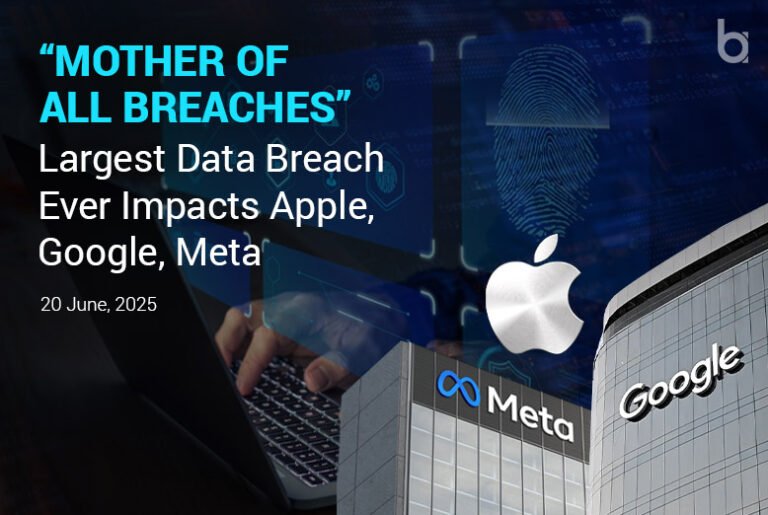Business APAC
20th June 2024
The digital landscape is reeling from what is being called the largest data breach ever in terms of aggregated credentials. Past login details, once considered dormant, have been weaponized through a colossal data compilation.
Dubbed the “Mother of all Breaches” (MOAB), this 12-terabyte digital arsenal contains an astonishing 16 billion login credentials. This is not a fresh hack, but rather a meticulous aggregation of thousands of prior data compromises, turning our collective history of lax password habits into a potent weapon against currently active accounts, including those with tech giants Apple, Google, and Meta (Facebook).
The MOAB: A Weaponized Data Trove
The sheer magnitude of the MOAB is challenging to fully grasp, but its real danger lies in its immediate utility for cybercriminals. Security analysts who unearthed this publicly exposed database confirm it as a master list derived from both historical and recent breaches. For malicious actors, this is akin to possessing a skeleton key to countless digital lives.
This unprecedented volume of data will be leveraged to execute “credential stuffing” attacks on an industrial scale. Imagine a thief systematically attempting a single old key on every door in a vast neighborhood. This is precisely what is transpiring globally, but with automated precision. The underlying assumption, often tragically accurate, is that the password used for a forgotten forum from years past might be the very same one safeguarding your primary email or online banking today. This truly constitutes the largest data breach ever in terms of potential impact on individual users.
Critical Accounts in the Crosshairs
While the data originates from a multitude of sources, the primary targets for criminals utilizing this information will undoubtedly be high-value platforms like Google, Apple, and Meta. Gaining access to even one of these core accounts can unravel an individual’s entire digital identity, granting attackers control over sensitive data ranging from personal photos and private messages to payment information and access to other linked services.
“This breach serves as a stark reminder that in cybersecurity, data is rarely truly gone,” stated a leading cybersecurity strategist. “It exposes a fundamental flaw in how we have managed digital identity for decades. We have, in essence, built digital fortresses on foundations of sand, and this is the tidal wave exposing that vulnerability. This is arguably the largest data breach ever in its systemic implications.”
Immediate Action: Securing Your Digital Footprint
Assuming your data is compromised is the only secure path forward. The imperative is to render this stolen information utterly useless to malicious actors.
- End Password Reuse. Immediately. This is the critical vulnerability the MOAB exploits. Every significant online account demands a unique, complex password. This is non-negotiable. Password managers are no longer a convenience; they are an indispensable tool for generating and securely storing these distinct credentials.
- Activate Multi-Factor Authentication (MFA). Two-factor or multi-factor authentication acts as an impenetrable shield, preventing a stolen password from unlocking your accounts. By requiring a secondary verification step, such as a code from your phone or a physical key, you effectively neutralize the threat posed by a leaked password. Enable it on every platform where it is offered.
- Conduct a Digital Spring Cleaning. It is high time to audit and delete accounts you no longer actively use. Each abandoned account with a reused password represents a latent vulnerability waiting to be exploited.
- Prepare for Enhanced Phishing Attempts. Armed with this granular data, criminals can craft highly personalized and convincing phishing scams. Maintain extreme vigilance and suspicion regarding any unsolicited email or message requesting login credentials or personal verification, even if it appears to originate from trusted entities like Google or Apple.
The End of the Password Era?
While technology companies publicly reaffirm their commitment to security, this particular incident highlights the inherent fragility of a defense mechanism that relies solely on user-managed secrets. The MOAB isn’t merely another data leak; it fundamentally argues that the password concept is irrevocably flawed.
This event serves as a painful yet necessary catalyst, accelerating the industry’s push towards a passwordless future, powered by more robust authentication methods like biometrics and hardware-based passkeys. For the immediate future, the digital ghosts of billions of old passwords have been unleashed. The only effective response is to actively construct a digital life that no longer relies on their security. This largest data breach ever will likely redefine our approach to online security.
Also Read: Rupee Hits ₹86.73 Against Dollar — How Much Worse Could It Get?



